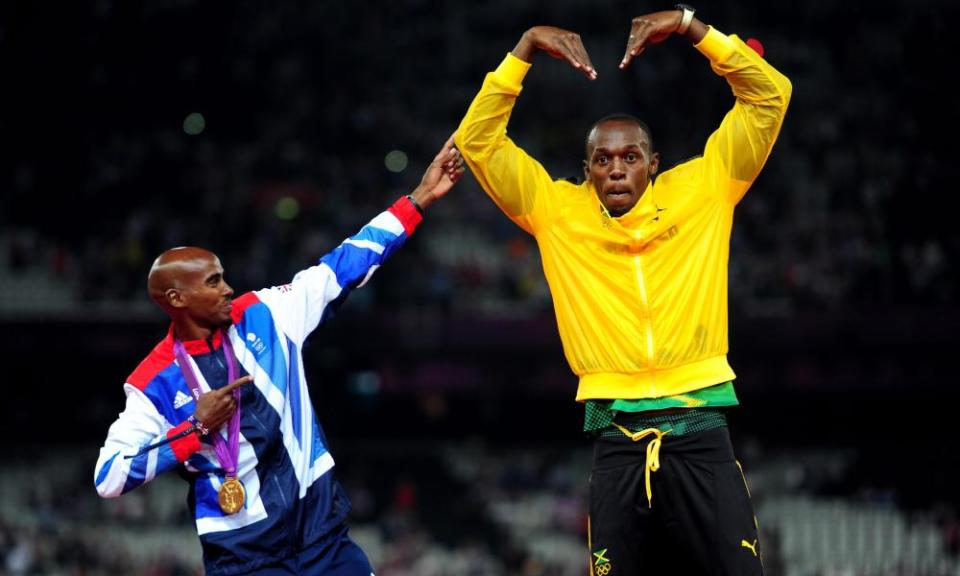Niels de Vos says future is bright as London prepares for Bolt and company

Niels de Vos has not slept much over the last six months, working 18-hour days as he combines being the chief executive of UK Athletics and London 2017. We meet on the top floor of a Stratford hotel, overlooking the stadium which has just hosted 300,000 spectators over 10 days of the World Para Athletics Championships.
“We sold more tickets than Wimbledon did and more than the Open golf,” says De Vos. “For a para athletics event that is incredible.”
There will be another 700,000 in attendance for the IAAF World Championships starting on 4 August, for which Usain Bolt is the headline act. Despite the quick turnaround between championships, De Vos is in a buoyant mood. He is particularly pleased having signed the biggest sponsorship partnership of his decade as CEO of UKA, a deal which will be announced next week and which he hopes will underwrite the core costs of the governing body for the next 10 years.
He is also energised by plans to bid for the European Athletics Championships in 2022 and to host the World Para Athletics Championships again in 2019.
“People are now starting to come to us saying: ‘Can we put our event into your stadium because it’s the best stadium in the world and you’re the best team in the world at putting events on.’ So that’s pretty cool,” says De Vos, “We really want this month of athletics in the London Stadium every year to be synonymous with the summer in the same way that Wimbledon is,” he adds. “There are a couple of one-day events which we hope to host next year. I think those will be real game changers, to appeal very much to the future generation. We offered £9.58 tickets for the World Championships the nights Bolt is running and that wasn’t because we couldn’t sell them at a higher price. It’s because those kids will be inspired to watch, participate and officiate in the future. That’s the more precise legacy.”
With Jessica Ennis-Hill’s retirement and Greg Rutherford unable to compete at the World Championships through injury, the number of bona fide gold medal contenders among Great Britain’s number is dwindling. De Vos admits that beyond Mo Farah they will be hard pushed to win any titles but warned against judging the team too harshly even if God Save the Queen is not ringing out too often.
“You can see at the moment that in most disciplines of athletics there is one person way above the rest and everyone else is fighting for the minor medals,” he says. “Certainly Wayde van Niekerk looks nailed on for a gold medal in the 400m and everyone else could pick up smaller medals.
“From a British perspective most of our medal shots could finish anywhere between eighth and second or third. But very few are likely to emerge and hit gold. There are one or two unfortunate injuries and often expectations are too high because winning a global track and field medal is brutally hard, probably more difficult than any other Olympic sport. But they go in buoyant and what we know is that they’ll be phenomenally well prepared and won’t let anyone down with their level of performance. I’m not discomforted by where we are right now.”
While booming ticket sales for London 2017 are rightly highlighted by De Vos as a triumph of organisation and marketing, the wider health of athletics as a spectator sport in this country is not so certain. At the British Championships in Birmingham in June one former athlete said it was the worst crowd she had seen in 16 years. It has been suggested a credibility crisis, with widespread doping scandals and corruption at the heart of the IAAF, athletics’ world governing body, has put off the crowds. But this is not a narrative De Vos recognises.
“People still trust in athletics,” he says. “I don’t buy that people are not interested in the sport because they’re still piling in to watch. People are aware that actually the sport is the cleanest it’s ever been and they definitely believe in British athletics.
“I just don’t buy this caricature,” he adds. “I don’t think there’s a credibility issue and some of the issues we’re talking about are quite historic. I think we’re in a great place in the UK, with more kids wanting to do athletics than ever before.”

 Yahoo Sport
Yahoo Sport 





































